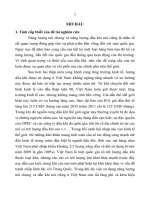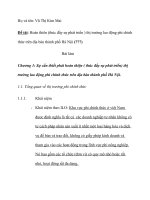câu hỏi thảo luận câu hỏi thảo luận khi nµo th× ®c cho r»ng häc sinh cña m×nh ® ph¸t ©m ®óng ®îc mét tõ §ó ®¸nh träng ©m cña tõ ®c thêng dùa vµo nh÷ng c¸ch nµo t¹i sao cçn ph¶i ®¸nh träng ©m
Bạn đang xem bản rút gọn của tài liệu. Xem và tải ngay bản đầy đủ của tài liệu tại đây (349.71 KB, 30 trang )
<span class='text_page_counter'>(1)</span><div class='page_container' data-page=1></div>
<span class='text_page_counter'>(2)</span><div class='page_container' data-page=2>
<b>Câu hỏi thảo luận</b>
<b>Câu hỏi thảo luận</b>
• <b><sub>Khi nào thì đ/c cho rằng học sinh của mình đã </sub><sub>Khi nào thì đ/c cho rằng học sinh của mình đã </sub></b>
<b>phát âm đúng đ ợc một từ </b>
<b>phát âm đúng đ ợc một từ ??</b>
• <b><sub>Để đánh trọng âm của từ, đ/c th ờng dựa vào </sub><sub>Để đánh trọng âm của từ, đ/c th ờng da vo </sub></b>
<b>nhng cỏch no ?</b>
<b>những cách nào ?</b>
</div>
<span class='text_page_counter'>(3)</span><div class='page_container' data-page=3></div>
<span class='text_page_counter'>(4)</span><div class='page_container' data-page=4>
<b>Syllables</b>
<b>Syllables</b>
A syllable is a group of one or more sounds. The A syllable is a group of one or more sounds. The
essential part of a syllable is a vowel sound ( V ). It
essential part of a syllable is a vowel sound ( V ). It
can have consonant sounds ( C ) before the V, after
can have consonant sounds ( C ) before the V, after
the V or before and after the V.
the V or before and after the V.
Eg: - Eye: V
Eg: - Eye: V
- Owe: V- Owe: V
- Go: CV- Go: CV
- If : VC- If : VC
</div>
<span class='text_page_counter'>(5)</span><div class='page_container' data-page=5>
<b>Syllables</b>
<b>Syllables</b>
Letters are not the same as sounds.Letters are not the same as sounds.
Eg: Consonant letters: W, Y are not consonant
Eg: Consonant letters: W, Y are not consonant
sounds if they come after the vowel sound in
sounds if they come after the vowel sound in
the syllable: Saw, say, how, low, pay, why…
the syllable: Saw, say, how, low, pay, why…
Here we use the word “ syllable” to talk about Here we use the word “ syllable” to talk about
the pronunciation of words, not the writing.
the pronunciation of words, not the writing.
Eg: Chocolate.
</div>
<span class='text_page_counter'>(6)</span><div class='page_container' data-page=6>
<b>Introducing syllables</b>
<b>Introducing syllables</b>
<b>Ex1:Ex1:</b>
<b>1. bought CVC1. bought CVC</b>
<b>2. eyes2. eyes</b> <b>VCVC</b>
<b>3. key3. key</b> <b>CVCV</b>
<b>4. day4. day</b> <b>CVCV</b>
<b>5. through5. through</b> <b>CCVCCV</b>
</div>
<span class='text_page_counter'>(7)</span><div class='page_container' data-page=7>
<b>Ex2: How many syllables?</b>
<b>Ex2: How many syllables?</b>
<b>1. secretary1. secretary</b> <b>0oo0oo</b>
<b>3. restaurant3. restaurant</b> <b>0o0o</b>
<b>5. different5. different</b> <b>0o0o</b>
<b>7. lovely7. lovely</b> <b>0o0o</b>
<b>9. Thursday9. Thursday</b> <b>0o0o</b>
</div>
<span class='text_page_counter'>(8)</span><div class='page_container' data-page=8>
<b>Word stress</b>
<b>Word stress</b>
To give stress to one of the syllables, do To give stress to one of the syllables, do
one or more of these:
one or more of these:
- Make it Make it <b>longer.longer.</b>
- Make it Make it <b>louder.louder.</b>
- Make it Make it <b>higher.higher.</b>
Eg:
</div>
<span class='text_page_counter'>(9)</span><div class='page_container' data-page=9>
<b>Word stress</b>
<b>Word stress</b>
Different words have different stress
Different words have different stress
patterns:
patterns:
0o: April , thirty , morning.
0o: April , thirty , morning.
o0: July, midday, thirteen.
o0: July, midday, thirteen.
0oo: Saturday, yesterday.
0oo: Saturday, yesterday.
o0o: September, tomorrow, eleventh.
o0o: September, tomorrow, eleventh.
</div>
<span class='text_page_counter'>(10)</span><div class='page_container' data-page=10>
<b>Word stress</b>
<b>Word stress</b>
Stress patterns can help you hear the Stress patterns can help you hear the
difference between similar words and know
difference between similar words and know
the meaning and class of words.
the meaning and class of words.
Eg: thirteen – thirty.
Eg: thirteen – thirty.
present – present.<sub>present – present.</sub>
There are two very important rules about There are two very important rules about
word stress:
word stress:
<b>1.</b>
<b>1.</b> <b>One word, one stress.One word, one stress.</b>
<b>2.</b>
</div>
<span class='text_page_counter'>(11)</span><div class='page_container' data-page=11>
<b>Exercise (Page 4)</b>
<b>Exercise (Page 4)</b>
<b>1. </b>
<b>1. 0o0o Monday Tuesday Thursday Monday Tuesday Thursday</b> <b> April April </b>
<b> </b>
<b> Second thirtySecond thirty</b>
<b>2. </b>
<b>2. o0<sub>o0</sub></b> <b>JulyJuly</b> <b> Thirteenth Thirteenth</b> <b>thirteenthirteen</b>
<b>3. </b>
<b>3. 0oo0oo Saturday Saturday</b> <b> Holiday Holiday</b> <b> seventy seventy</b>
<b>4. o0o</b>
<b>4. o0o September September October November October November </b>
<b> </b>
<b> eleventh eleventh </b>
<b>5. oo0</b>
</div>
<span class='text_page_counter'>(12)</span><div class='page_container' data-page=12>
<b>Stress in two syllable words.</b>
<b>Stress in two syllable words.</b>
Words come from a one-syllable word: Stress Words come from a one-syllable word: Stress
on the syllable of the original word.
on the syllable of the original word.
Eg: - Artist, driver, friendly..
Eg: - Artist, driver, friendly..
</div>
<span class='text_page_counter'>(13)</span><div class='page_container' data-page=13>
<b>Two syllable nouns and Adjectives</b>
<b>Two syllable nouns and Adjectives</b>
Most two - syllable nouns and adjectivesMost two - syllable nouns and adjectives<sub> have </sub><sub> have </sub>
stress on the
stress on the <b>firstfirst</b> syllable, even if they do not syllable, even if they do not
come from an original one-syllable word.
come from an original one-syllable word.
Eg: The artist’s most famous picture show some
Eg: The artist’s most famous picture show some
women and children in a lovely forest with a
women and children in a lovely forest with a
purple mountain behind.
</div>
<span class='text_page_counter'>(14)</span><div class='page_container' data-page=14>
<b>Two - syllable verbs</b>
<b>Two - syllable verbs</b>
Most two-syllable verbs have stress on the Most two-syllable verbs have stress on the
<b>second</b>
<b>second</b> syllable, even if they do not come syllable, even if they do not come
from an original one - syllable word.
from an original one - syllable word.
Eg: forget
Eg: forget
decidedecide
importimport
complaintcomplaint
</div>
<span class='text_page_counter'>(15)</span><div class='page_container' data-page=15>
<b>Two - syllable verbs</b>
<b>Two - syllable verbs</b>
<b>Note:Note:</b>
- There is not always a change of stress in There is not always a change of stress in
words that are nouns and verbs.
words that are nouns and verbs.
Eg: Answer, picture, promise, reply, travel, visit:
Eg: Answer, picture, promise, reply, travel, visit:
Stress on the same syllable.
Stress on the same syllable.
- The stress stays in the same place when you The stress stays in the same place when you
make longer words from these two - syllable
make longer words from these two - syllable
nouns, adjectives and verbs.
nouns, adjectives and verbs.
Eg: happy – unhappy, depart - departure.
</div>
<span class='text_page_counter'>(16)</span><div class='page_container' data-page=16>
<b>Exercise 1(page 7)</b>
<b>Exercise 1(page 7)</b>
1. (act) How did you1. (act) How did you react react when you saw the when you saw the
actor
actor coming in? coming in?
2. (write) The 2. (write) The writerwriter decided to decided to rewriterewrite the the
whole book.
whole book.
3. (paint) The 3. (paint) The painterpainter tried to tried to repaintrepaint this part this part
of picture
of picture
4. (print) We asked the 4. (print) We asked the printerprinter to to reprint reprint the the
whole document.
</div>
<span class='text_page_counter'>(17)</span><div class='page_container' data-page=17>
<b>Exercise 2 (page7)</b>
<b>Exercise 2 (page7)</b>
Ex2: Hightline the word with a different stress pattern from Ex2: Hightline the word with a different stress pattern from
the others
the others
1. Answer1. Answer agreeagree allowallow attractattract
2. middle2. middle minuteminute missionmission mistakemistake
3. compare3. compare correctcorrect copycopy collectcollect
4. garden4. garden grannygranny guitarguitar grammargrammar
5. 5. completecomplete commoncommon carefulcareful crazycrazy
6. produce6. produce provideprovide promisepromise preferprefer
7. 7. shampooshampoo shouldershoulder showershower shoppingshopping
8. 8. reasonreason removeremove receivereceive
</div>
<span class='text_page_counter'>(18)</span><div class='page_container' data-page=18>
<b>Stress in longer words</b>
<b>Stress in longer words</b>
Words have prefix or suffix, stress stays the Words have prefix or suffix, stress stays the
same as in the original word.
same as in the original word.
Eg: Forget
Eg: Forget
Forgetful<sub>Forgetful</sub>
Unforgettable.Unforgettable.
Some endings do change the stress in the Some endings do change the stress in the
shorter word.
shorter word.
Eg: Educate
Eg: Educate
</div>
<span class='text_page_counter'>(19)</span><div class='page_container' data-page=19>
<b>Stress in longer words</b>
<b>Stress in longer words</b>
Ex1: Give stress to the following wordsEx1: Give stress to the following words
ElectricElectric electricianelectrician clinicclinic
publicpublic atomicatomic MusicMusic
musicianmusician decorationdecoration economiceconomic
</div>
<span class='text_page_counter'>(20)</span><div class='page_container' data-page=20>
<b>Stress in longer words.</b>
<b>Stress in longer words.</b>
When we add the endings: -ion, -ian or –ic: When we add the endings: -ion, -ian or –ic:
Stress always move to the syllable
Stress always move to the syllable <b>beforebefore</b>
these endings.
these endings.
Note: When a syllable changes from Note: When a syllable changes from
unstressed to stressed or stressed to unstressed,
unstressed to stressed or stressed to unstressed,
the vowel sound often changes.
the vowel sound often changes.
Eg: Economy – Economic.
</div>
<span class='text_page_counter'>(21)</span><div class='page_container' data-page=21>
<b>Exercise 1(page10)</b>
<b>Exercise 1(page10)</b>
0o
0o Nation, clinic publicNation, clinic public
o0o
o0o Relation romantic discussionRelation romantic discussion
oo0o
oo0o Population scientific pessimisticPopulation scientific pessimistic
ooo0o
ooo0o Communication pronunciation investigationCommunication pronunciation investigation
oooo0o
oooo0o identificationidentification
ooooo0o
</div>
<span class='text_page_counter'>(22)</span><div class='page_container' data-page=22>
<b>Exercise 2(Page 10)</b>
<b>Exercise 2(Page 10)</b>
</div>
<span class='text_page_counter'>(23)</span><div class='page_container' data-page=23>
<b>Stress in longer words</b>
<b>Stress in longer words</b>
For longer words end in – y and - al: Stress on For longer words end in – y and - al: Stress on
the third syllable from the end.
the third syllable from the end.
Eg: Publicity, chemistry, biology, critical,
Eg: Publicity, chemistry, biology, critical,
geological, geology…….
</div>
<span class='text_page_counter'>(24)</span><div class='page_container' data-page=24>
<b>Stress in longer words 2</b>
<b>Stress in longer words 2</b>
<b>G</b>
<b>Give stress to the following words and read them ive stress to the following words and read them </b>
<b>aloud</b>
<b>aloud</b>
Physics Physics 0o.0o.
chemistry chemistry 0oo 0oo
biology biology o0oo o0oo
history history 0oo0oo
geography geography o0ooo0oo
EconomicsEconomics oo0ooo0o
Mathematics oo0o Mathematics oo0o
Geology
</div>
<span class='text_page_counter'>(25)</span><div class='page_container' data-page=25>
<b>Exercise 2 (page13)</b>
<b>Exercise 2 (page13)</b>
How the stress pattern moving.How the stress pattern moving.
</div>
<span class='text_page_counter'>(26)</span><div class='page_container' data-page=26>
<b>Compound words</b>
<b>Compound words</b>
For compound Nouns: The stress is on the For compound Nouns: The stress is on the
<b>first</b>
<b>first</b> part part
Eg: Blackboard, washing machine.
Eg: Blackboard, washing machine.
For compound Adjectives: The stress on the For compound Adjectives: The stress on the
<b>second</b>
<b>second</b> part. part.
Eg: Bad-tempered, old- fashioned..
Eg: Bad-tempered, old- fashioned..
For compound Verbs: The stress is on the For compound Verbs: The stress is on the
<b>second</b>
<b>second</b> part. part.
Eg: Understand, overflow..
</div>
<span class='text_page_counter'>(27)</span><div class='page_container' data-page=27>
<b>Rules of word stress</b>
<b>Rules of word stress</b>
One word, one stress.One word, one stress.
Stress is always on a vowel.Stress is always on a vowel.
Stress on first syllables: Two- syllable Nouns and Stress on first syllables: Two- syllable Nouns and
Adjectives.
Adjectives.
Stress on second syllables: Two-syllable Verbs.Stress on second syllables: Two-syllable Verbs.
Stress on second syllable from end: words end in: – Stress on second syllable from end: words end in: –
ic, -sion, –tion.
ic, -sion, –tion.
Stress on third syllable from end: Words end in –y, Stress on third syllable from end: Words end in –y,
-al.-al.
Compound Nouns: Stress on first part.Compound Nouns: Stress on first part.
Compound Adjective and Verbs: Stress on second Compound Adjective and Verbs: Stress on second
</div>
<span class='text_page_counter'>(28)</span><div class='page_container' data-page=28>
<b>Sentence stress</b>
<b>Sentence stress</b>
Ex1:Hightline the sentence that doesn’t have the same stress Ex1:Hightline the sentence that doesn’t have the same stress
pattern as the word….
pattern as the word….
1. 0oo cinema1. 0oo cinema wasn’t itwasn’t it hasn’t shehasn’t she Don’t you?Don’t you?
2. o0o tomato2. o0o tomato close the doorclose the door he told me he told me I like it I like it
3. oo0 afternoon3. oo0 afternoon does he drive?does he drive? Were you cold? Were you cold?
What happened ?
What happened ?
</div>
<span class='text_page_counter'>(29)</span><div class='page_container' data-page=29>
<b>Exercise 2</b>
<b>Exercise 2</b>
Ex2: Write the sentences in Ex2: Write the sentences in
the correct column
the correct column
0oo0
0oo0 o0o0o0o0 0o00o0 0o0o0o0o
What do you
What do you
want?
want?
Give me a call.
Give me a call.
What did he
What did he
say?
say?
The bus was
The bus was
late.
late.
The water’s
The water’s
cold.
cold.
It’s cold and
It’s cold and
wet.
wet.
Come and
Come and
look.
look.
Where’s the
Where’s the
car?
car?
What’s the
What’s the
time?
time?
Close the
Close the
window.
window.
Nice to see
Nice to see
you.
you.
Phone and tell
Phone and tell
me.
</div>
<span class='text_page_counter'>(30)</span><div class='page_container' data-page=30>
Thank you very much
Thank you very much
for your attention
</div>
<!--links-->









